#H.R. Morgan
Explore tagged Tumblr posts
Text
Before the Flash season 6 DVDs came out, and theories about the original concept for Echo were still being discussed (not by a huge portion of the fandom, but by a few folks at least), someone theorized that he was originally meant to be an evil future version of E1 Cisco (à la Savitar). And I didn't really like that idea, but I built onto it, anyway, with the idea that he was the future version of Cisco from The Once And Future Flash, who had somehow gotten thrown into the Iris Lives timeline when the Iris Dies timeline was erased.
And like, I didn't want Echo to be that Cisco—because the best thing about that episode/timeline is that future!Cisco is still the same caring and hopeful person as always—and I didn't even seriously think that he was him, but it was a fun theory to explore nonetheless. I had a whole long-ass post written about it in my drafts, going into how Echo doesn't have Vibe powers because he lost his hands, supported by the fact that Echo wears gloves in every scene he's in, and I figured he probably had breach psychosis, too, since he still had the dark matter in his DNA but couldn't access his powers. And all that, plus the fact that Breacher said none of Cisco's doppelgängers were scientists, and the way that Echo saying, "I'm not just 'some other' version of you," sounded like it was leading to a different kind of reveal, plus the maniacal laugh when he tells Cisco he killed Cynthia all added up so nicely in support of my theory—that is, until I rewatched the Cisco/Echo confrontation scene and saw that there is a brief moment where you see Echo's hands before he puts his gloves back on, and that killed the whole thing and I deleted the post without publishing it.
Then of course the DVDs came out and I learned that the thing that was changed about Echo was his motive, not where he came from, so we were all overthinking it, anyway. But I still think about that theory from time to time, and how it came so close to being plausible.
#The Flash#Cisco Ramon#Echo#The Once And Future Flash#Kiss Kiss Breach Breach#just now almost had a theory going about how Randolph from Earth-19 was a Ralph Dibny doppelgänger#y'know 'cause Ralph is short for Randolph#but then I remember that we saw Randolph's face when H.R. disguised himself as him#and that his last name is actually mentioned I think? isn't it Morgan?#so yeah that theory died even faster than the Echo one#but my theory/headcanon about the fallout from Ralph surviving the particle accelerator explosion post-Flashpoint is still going strong
2 notes
·
View notes
Text
I Can See You
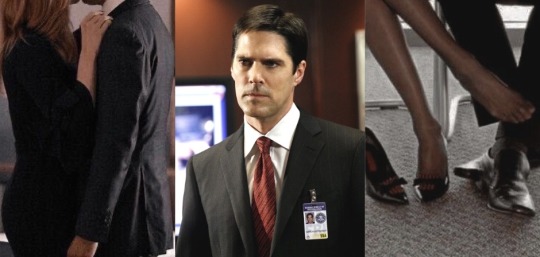

18+ Content. Minors DNI
Pairing: Fem!Reader x Aaron Hotchner
Description: When a new agent joins the team, she's beloved by everybody and Aaron admires her dedication. He admires it so much that he fantasizes about her in every possible scenario to the point where he has to distance himself. One day, she confronts him.
Content Warnings: Power imbalance with leader/team member , reader is flirty with Hotch and loves seeing him flustered, he gets tired of her running her mouth, exhibitionism kink (kinda?), spanking, reader is gagged with a necktie, praise, degradation, fingering, unprotected sex.
Word Count: 2.6K
Navigation || Masterlist || Taglist || Request
Tags 🏷️ @beardedhotchh @pastanoodles11 @morgthemagpie @x0xonatalie
This has been rewritten twenty times. I had to post this before I deleted it all over again. So, I'm sorry in advance if it isn't like my usual writing.

Aaron Hotchner was the stoic, fearless leader of the Behavioral Analysis Unit. He took pride in his strength and dedication to his career, even if most people didn’t understand how he could pull countless hours in a career field that took a physical and mental toll.
His life revolved around his job, his son being his other top priority, even though he really couldn’t very well balance things the way he intended. His loyalty to his career took a good amount from him as well. It could drain his sanity and a divorce came out of it.
He was tough, keeping his composure through some of the worst things imaginable when most others would crumble under all the pressures of a demanding career as well as a failed marriage. However, it numbed him from the horrors, making him tense all the time.
That is, until Y/N showed up at the BAU for an interview to take over an available position. She was the top of her class at the academy. She was physically, academically, as well as mentally strong enough to handle the job and she had a backlog of receipts to prove it.
Her life was spent with training, her father being a general in the United States Marine Corps, wanting his daughter to follow in his footsteps.
Imagine his shock when she used every piece of knowledge she had in order to get into the FBI.
It was a smart career choice for her. She could handle herself in the toughest of situations, being trained how to get through the most intense of scenarios. She also liked putting in her thoughts and ideas to a group who openly accepted them, nothing being shut out because she was the youngest of the team.
She was an asset.
Aaron had told her plenty of times how lucky they were to have her, how she was a tremendous addition to an already powerful group of profilers. She had a lot to learn but she was pretty well off.
Y/N loved her career and her team. However, Aaron Hotchner piqued her interest. He was well known as the leader of the BAU who has had a rich career and he had many written articles and other pieces of information that retold the stories of the most intense cases he ever had to get into.
It didn’t help that the man was sex on legs.
He was attractive, the smallest things he did captured her attention in such a way that there were vivid fantasies and daydreams of things they could do. She liked to think that she could show him things he hadn’t seen in years, if ever..
So, that was when she was planting subtle seeds. There were lingering touches and flirting that would make Derek Morgan blush. It was innocent enough, the casual flirtatious remark that would have the unit chief flustered, cheeks a shade of dusty pink.
The idea of being with a member of his team seemed wrong. Not only was it a ton of paperwork but it was also an H.R. nightmare.
It couldn’t stop him from fantasizing though. All the ideas he had about bending her over his desk, his tie forced into her mouth in order to muffle the cries and moans that would spill from her lips.
This was dangerous territory to tread. Yet he liked the game, the risk of it all. The problem was that he couldn’t very well just come on to her, the biggest risk factor being the word spreading across the office. That was the last thing either of them needed.
These vivid fantasies forced him into hiding, his office being the place he’d be able to be alone in. The same office where he’d glazed his knuckles with cum just thinking about the sheer idea of having Y/N under the desk, her lips enveloping his cock like she was made for it.
It was one of those days where he had to hide away, the quiet nature of the office being contributed to paperwork being caught up on and files being put away. Aaron was doing his best, gazing at an open file while he was tapping the back of the pen against the desk.
His mind was quite adventurous today, his cock hard and luckily concealed by the desk he was positioned at. All Y/N did was sip her coffee from a straw, her lipstick staining the metal straw from the tumbler as she was enthralled in her own paperwork.
Somehow, that was enough to have him trembling in his office chair.
It was pathetic, like he was reliving the times of being a horny teenager who got turned on by damn near everything in sight.
However, it wasn’t long until he heard a knock against the door, gaze tilted upwards. That was when his worst fear entered the room. Y/N. The one who had him hard as a rock at his desk, the one who had been giving him hell for the months she’d been working there.
“Y/L/N. What can I do for you?”
“I wanted to drop off a file for your review.” Her words were soft as she held it up. “Also, can I talk to you?”
Fuck.
“Of course. Shut the door.”
The minute the door was shut, that was when that suffocating sexual tension was filling the room, so bad that he was sure he wouldn’t be able to breathe until she left. “What’s the problem?”
“Are you mad at me? Because you haven’t spoken to me. You actively ignore me.” Her boldness was something he expected, the woman not being one to lightly word anything.
“Of course I’m not mad at you. I don’t see why you’d think I��ve been avoiding you.”
“You run straight to your office! Don’t bullshit me, Hotchner. What did I do?”
“Nothing! You’ve done nothing.”
She didn’t believe him, eyes narrowing as she leaned back in the chair behind her. She was sure why he ignored her. Or maybe it was just a delusion she had where he actively wanted her just as badly as she wanted him.
“I see the way you look at me, Aaron.”
“Excuse me?”
“You think I can’t tell? You think I didn’t notice the way you make it a point to brush against me? The way that you wait for me before you even attempt to walk down the hall?”
Fuck. She was a better profiler than he gave her credit for.
“I don’t know-”
“You think I also didn’t notice the way that you looked at me when I was sipping my coffee? The way that you just had to run into your office before anything could be noticed? Aaron, you’re a profiler. You should do better at hiding your reactions.”
The words had him flabbergasted, mouth open in disbelief from the indication that he’d be turned on by something as small as her sipping a straw. Too bad she hit the nail right on the goddamn head.
“This isn’t appropriate. I advise you to leave my office.”
“Walk me out. Or are you too afraid to show me how right I am?”
The silence after that was loud. It was like Aaron had to collect himself.
“That’s what I thought.” Y/N taunted, making the male finally stand up from his desk. That was what caused her to shut her mouth entirely, looking at her boss wide-eyed as if she’d just gotten in trouble.
“What? You’re not gonna talk anymore? I think you’re getting too smug with this.” He spoke, voice low as the tone of authority took over. He walked to the office door to lock it, lowering the blinds soon after to avoid the whole office looking inside.
“Nothing to say?” He asked, arms tucked over his chest as Y/N was slowly looking away. “W-well..”
“Pathetic. I knew you were all bark and no bite. It’s a shame.” He tsked, head shaking with disapproval. “Now get up.”
Y/N was slow as she was standing up, her face flushing as she could feel arousal soaking into her panties at his authoritative tone, his eyes dark as he watched her body rise from the chair before her arms were behind her back.
“You’ve been pushing my buttons ever since you started with the flirting bullshit.” His veiny hands were moving to remove the tie from his neck, eyes watching her figure as she seemed frozen; a deer in headlights.
“I think it’s time to give a cocky little brat what she wants. Open your mouth.”
With an eyebrow raising, Y/N slowly let her mouth fall open. The moment she felt the tie being stuffed in her mouth, she barely had time to process what was happening before she was being bent over the desk.
There was a mess of files and other items that she’d landed on, head tilting to the side as she let her eyes stay on Aaron.
He looked at her with hunger, like a predator stalking its prey and ready to pounce at any given point. The normally beautiful honey colored irises were clouded over with deep lust, his hands running down her hips while he was situated behind her.
“You need to be taught to respect your unit chief. I’m not gonna tolerate your behavior any longer after this.”
The woman was keeping her eyes on Aaron, body making an effort to push back against his for any ounce of friction. “Ah! No ma’am.” The man began, hand roughly coming down to give her clothed ass a rough slap.
The sting had her moaning around the tie in her mouth, tears brimming her eyes from the pleasurable pain, body jerking when three more hits were coming down. “You’re not getting what you want. You are too entitled and I’m sick of it.”
His hands were moving to grip her hips, thumbs running over the skin under her shirt just to feel the warmth of her soft skin. “Let me know if you want me to stop at any point.” He spoke, tone hard yet his demeanor softened.
Last thing he was going to do was do anything that she was uncomfortable with.
When there was an indication that she wanted him to keep up with his motions, his hands were moving to bunch up the skirt around her hips. Aaron’s eyebrows raised in curiosity. “Look at how wet you are.. I haven’t even done anything to you yet.” His hand was running up the back of Y/N’s thigh, continuing onward until the palm of his hand was flush against her clothed cunt, the warmth radiating against his hand as he was adding pressure, chuckling at the muffled whine.
“So desperate. Gonna fuck you with my fingers, think you can handle that?” He asked, finger slowly moving to push her wet panties to the side, thumb making its way to her clit, eliciting another muffled moan. As his hand was pulling back, he let his middle finger slowly run through her folds, the arousal generously coating his finger before he was slowly pushing it into her tight heat.
He could’ve came in his pants right there, mouth open slightly as he was greeted with warm, velvety walls that were tightening around the digit from just how desperate the woman was. “Keep still.” He warned, watching the hips try and rock against his hand.
“You were talking so much shit earlier. Now look at how desperate you are,”
The words caused Y/N’s body to shudder with anticipation of getting more than one finger, playing his game and cooperating.
“There we go. See what happens when you listen and you’re not combative and smug? I just might like you better with my tie in your mouth.” He snickered, a second finger slowly sliding into her dripping cunt as he worked on scissoring her open. “Fuck, you’re such a pretty little thing.” He praised, unholy sounds of squelching filling the room from her wetness.
As his fingers curled upwards, he couldn’t help the chuckle that left his lips as soon as she was gasping around his tie, his fingertips pushing the spongy spot inside of her that had her eyes fluttering shut, drool from the corners of her mouth due to the tie starting to run down her jaw.
Thankfully, Aaron had an extra so this wouldn’t be suspicious when the other profilers were surrounded by Y/N after the deed here was done. If anything, this appeared to be a typical conversation between one of the team members and their leader.
When her walls were spasming around his fingers, he took the opportunity to slip both fingers out of her cunt while chuckling at her whine in response to that. “Such a needy little slut. Don’t worry.. I’m gonna take care of you. Just gotta keep quiet.”
The words made Y/N’s pussy clench around nothing, a muffled moan filling the office as the sound of his belt being undone chased behind it. After tossing the belt to the side, he pushed his pants down along with his boxers.
“Shh, I know.” He whispered as if it were a secret between them when he could hear her whines of impatience, his hand wrapping around his hard cock, hand giving it a few lazy tugs to prepare himself. He let his thick tip tease her folds, spreading her slick around as if the two needed lube. “Alright. Ready?”
With one hand on her hip, he was slowly pushing his cock into her tight cunt, groaning lowly as he watched her pussy envelope his shaft, swallowing him to the hilt while her hands were holding onto the desk tightly.
He waited a solid minute for her to adjust, his hand rubbing her lower back in an effort to soothe her, wanting to have her as comfortable as possible.
When she was giving him the sign she was ready, he was rolling his hips slowly, the man letting out a soft breath that he didn’t know he was holding in. Bringing both hands to grip her hips, it wasn’t long until he was doing deeper, faster strokes.
“Fuck, bite my tie harder, darling. You’re being too loud.” He murmured, hips continuing to slam into hers as a thin layer of sweat was collecting on his forehead. With the desk rocking at a rhythm with Aaron’s thrusts, it was no surprise when some papers or files were falling to the ground around the desk.
He wasn’t gonna worry about that now.
Currently, he was too focused on the rough snap of his hips against Y/N’s, the sound of skin crashing against one another as well as their combined noises filling the office, the desk making its own audio debut as he got a bit rougher as he was fucking her pussy raw.
“Fuck. I’m gonna cum.” He growled, cock twitching as he could feel Y/N’s tight cunt clench him in place, his hand now reaching down to find her throbbing, desperate clit to bring her to relief.
As soon as he could feel her velvety walls pulsating around him and the feeling of her creaming on his cock, that was it for him. His nails dug into her hips, no doubt leaving crescent moon marks while her cunt was milking all the cum that Aaron had to offer.
“Y/L/N,” He spoke, chest rising and falling as he was working on catching his breath, his hand moving to her mouth to retrieve his now soaked tie.
“You need some lessons on manners for that fucking mouth of yours.” His voice was low as he was pulling his cock from her warmth, watching his cum leak out of her pussy before slowly pulling her panties back up.
“I think I know just the way to help you though,”

#criminal minds#criminal minds fandom#criminal minds fic#criminal minds fanfic#aaron hotchner fandom#aaron hotchner fic#aaron hotchner fanfiction#aaron hotchner x y/n#aaron hotchner imagine#ssa aaron hotchner#aaron hotchner blurb#aaron hotchner x you#aaron hotchner au#aaron hotchner drabble#aaron hotchner dialogue#aaron hotchner#aaron hotchner scenario#aaron hotchner one shot#aaron hotchner x reader#Spotify
286 notes
·
View notes
Text
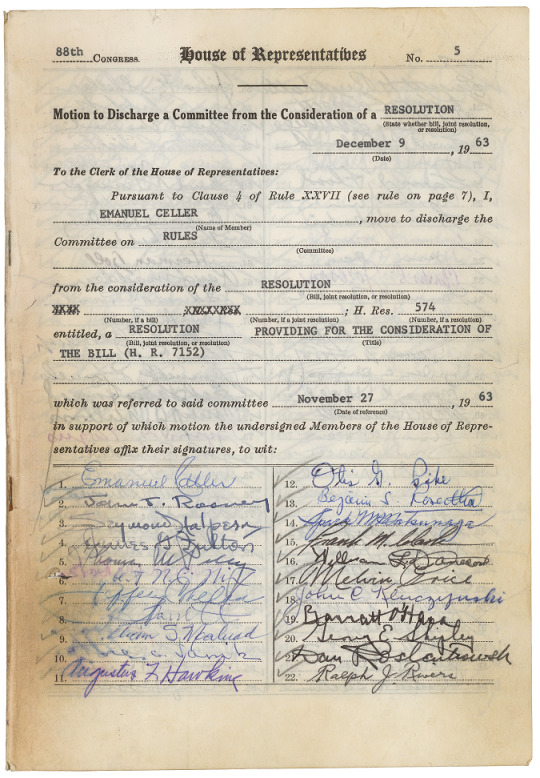
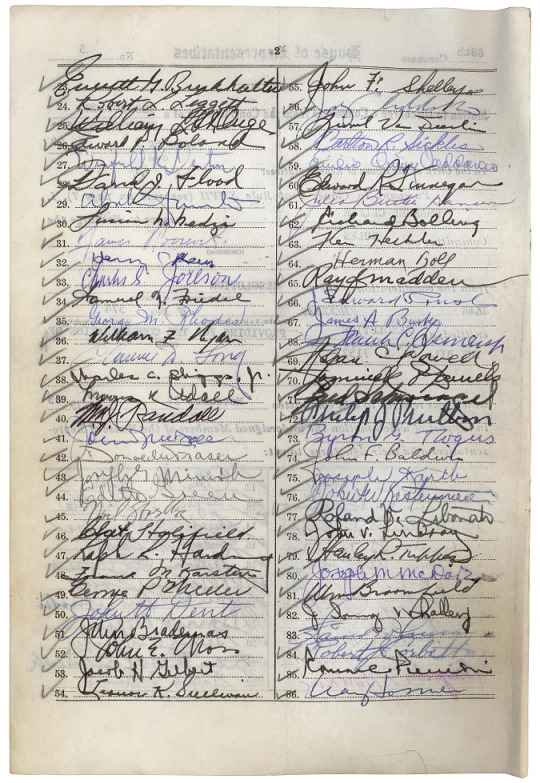
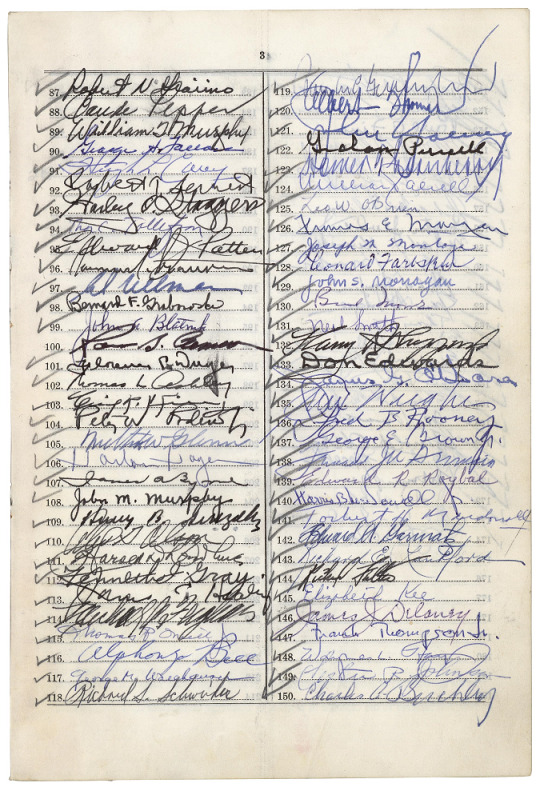

Discharge Petition for H.R. 7152, the Civil Rights Act of 1964
Record Group 233: Records of the U.S. House of RepresentativesSeries: General Records
This item, H.R. 7152, the Civil Rights Act of 1964, faced strong opposition in the House Rules Committee. Howard Smith, Chairman of the committee, refused to schedule hearings for the bill. Emanuel Celler, Chairman of the Judiciary Committee, attempted to use this discharge petition to move the bill out of committee without holding hearings. The petition failed to gain the required majority of Congress (218 signatures), but forced Chairman Smith to schedule hearings.
88th CONGRESS. House of Representatives No. 5 Motion to Discharge a Committee from the Consideration of a RESOLUTION (State whether bill, joint resolution, or resolution) December 9, 1963 To the Clerk of the House of Representatives: Pursuant to Clause 4 of Rule XXVII (see rule on page 7), I EMANUEL CELLER (Name of Member), move to discharge to the Commitee on RULES (Committee) from the consideration of the RESOLUTION; H. Res. 574 entitled, a RESOLUTION PROVIDING FOR THE CONSIDERATION OF THE BILL (H. R. 7152) which was referred to said committee November 27, 1963 in support of which motion the undersigned Members of the House of Representatives affix their signatures, to wit: 1. Emanuel Celler 2. John J. Rooney 3. Seymour Halpern 4. James G Fulton 5. Thomas W Pelly 6. Robt N. C. Nix 7. Jeffery Cohelan 8. W A Barrett 9. William S. Mailiard 10. 11. Augustus F. Hawkins 12. Otis G. Pike 13. Benjamin S Rosenthal 14. Spark M Matsunaga 15. Frank M. Clark 16. William L Dawson 17. Melvin Price 18. John C. Kluczynski 19. Barratt O'Hara 20. George E. Shipley 21. Dan Rostenkowski 22. Ralph J. Rivers[page] 2 23. Everett G. Burkhalter 24. Robert L. Leggett 25. William L St Onge 26. Edward P. Boland 27. Winfield K. Denton 28. David J. Flood 29. 30. Lucian N. Nedzi 31. James Roosevelt 32. Henry C Reuss 33. Charles S. Joelson 34. Samuel N. Friedel 35. George M. Rhodes 36. William F. Ryan 37. Clarence D. Long 38. Charles C. Diggs Jr 39. Morris K. Udall 40. Wm J. Randall 41. 42. Donald M. Fraser 43. Joseph G. Minish 44. Edith Green 45. Neil Staebler 46. 47. Ralph R. Harding 48. Frank M. Karsten 49. 50. John H. Dent 51. John Brademas 52. John E. Moss 53. Jacob H. Gilbert 54. Leonor K. Sullivan 55. John F. Shelley 56. 57. Lionel Van Deerlin 58. Carlton R. Sickles 59. 60. Edward R. Finnegan 61. Julia Butler Hansen 62. Richard Bolling 63. Ken Heckler 64. Herman Toll 65. Ray J Madden 66. J Edward Roush 67. James A. Burke 68. Frank C. Osmers Jr 69. Adam Powell 70. 71. Fred Schwengel 72. Philip J. Philiben 73. Byron G. Rogers 74. John F. Baldwin 75. Joseph Karth 76. 77. Roland V. Libonati 78. John V. Lindsay 79. Stanley R. Tupper 80. Joseph M. McDade 81. Wm Broomfield 82. 83. 84. Robert J Corbett 85. 86. Craig Hosmer87. Robert N. Giaimo 88. Claude Pepper 89. William T Murphy 90. George H. Fallon 91. Hugh L. Carey 92. Robert T. Secrest 93. Harley O. Staggers 94. Thor C. Tollefson 95. Edward J. Patten 96. 97. Al Ullman 98. Bernard F. Grabowski 99. John A. Blatnik 100. 101. Florence P. Dwyer 102. Thomas L. ? 103. 104. Peter W. Rodino 105. Milton W. Glenn 106. Harlan Hagen 107. James A. Byrne 108. John M. Murphy 109. Henry B. Gonzalez 110. Arnold Olson 111. Harold D Donahue 112. Kenneth J. Gray 113. James C. Healey 114. Michael A Feighan 115. Thomas R. O'Neill 116. Alphonzo Bell 117. George M. Wallhauser 118. Richard S. Schweiker 119. 120. Albert Thomas 121. 122. Graham Purcell 123. Homer Thornberry 124. 125. Leo W. O'Brien 126. Thomas E. Morgan 127. Joseph M. Montoya 128. Leonard Farbstein 129. John S. Monagan 130. Brad Morse 131. Neil Smith 132. Harry R. Sheppard 133. Don Edwards 134. James G. O'Hara 135. 136. Fred B. Rooney 137. George E. Brown Jr. 138. 139. Edward R. Roybal 140. Harris. B McDowell jr. 141. Torbert H. McDonall 142. Edward A. Garmatz 143. Richard E. Lankford 144. Richard Fulton 145. Elizabeth Kee 146. James J. Delaney 147. Frank Thompson Jr 148. 149. Lester R. Johnson 150. Charles A. Buckley4 151. Richard T. Hanna 152. James Corman 153. Paul A Fino 154. Harold M. Ryan 155. Martha W. Griffiths 156. Adam E. Konski 157. Chas W. Wilson 158. Michael J. Kewan 160. Alex Brooks 161. Clark W. Thompson 162. John D. Gringell [?] 163. Thomas P. Gill 164. Edna F. Kelly 165. Eugene J. Keogh 166 John. B. Duncan 167. Elmer J. Dolland 168. Joe Caul 169. Arnold Olsen 170. Monte B. Fascell [?] 171. [not deciphered] 172. J. Dulek 173. Joe W. [undeciphered] 174. J. J. Pickle [Numbers 175 through 214 are blank]
39 notes
·
View notes
Text

December 1934. A Margaret Brundage cover announcing that this issue of WEIRD TALES features a Robert E. Howard novelette, along with a short story by Bassett Morgan ("The Vengeance of Ti Fong"); the novelette "Xeethra" by Clark Ashton Smith; and the novelette "Black God's Shadow" by C.L. Moore. Other contents include a translation of the Jean Ray story "Le gardien du cimetière"; a chapter of the serial "The Trail of the Cloven Hoof" by Arlton Eagie; short stories by Brooke Byrne, August Derleth, and Frank Owen; and interior art by H.R. Hammond.
#pulp magazine#pulp art#pulp covers#weird tales#margaret brundage#robert e howard#clark ashton smith#c l moore#august derleth#h r hammond#jean reay#arlton eagie
9 notes
·
View notes
Text
The Storm Bringer (Information and History)

PHYSICAL DESCRIPTION:
——————————————————————————
LOCATION:
Dock of Arendelle (sometimes after d3),
Dock of Auardon (sometimes after d3),
Dock of Corona (sometimes after d3),
Dock of Neverland (sometimes after d3),
Dock of the Isle of the Lost (d1-d3).
OWNER(S):
Blackbeard (Captain)(Previously),
Hannah Hook (Captain)(Current),
René Montaudoin (Captain)(Previously).
WORKERS:
Aaron Bog (The Treasuer),
Abi Hun (Crewmate)(Former),
Alex Aoratos-Sinclair (Helmsman),
Amira Bint Aladdin Bin Cassim Al Hamed of Agrabah (Translator)(Future),
Anna Bog (The Lawyer),
Artemis Foundling (Junior),
Atlas Foundling (Junior)(Future),
Atticus Hook (Babysitter Crewmate)(Former),
Beau Foundling (Junior),
Clarice Foundling (Junior)(Future),
Craven Bog (Junior)(Future),
Credence Foundling (Junior),
D.E Anonymous (Anonymous Helper),
Darcy Aoratos (The Medic),
Darius Foundling (Junior),
Darren Foundling (Junior)(Future),
Derrick Red (Crewmate)(Former),
Eduardo Frollo (The Cooper),
Elara Foundling (Junior),
Evelyn de la Cruz (The Prison Guard),
Fiona Foundling (The Look Out),
Francesca Delgado (The Boatswain),
Genesis Flores (The Navigator),
Greyson Hook (Crewmate)(Former),
Gunner Harp (Back up Medic),
Harley Foundling (Junior),
Haul Bjorgman (The Deckhand and Translator)(Future),
Herlando Dancer (Back up Medic),
Hope Sid (The Entertainment and h.r. Representative),
Howiee Wolf (Guard),
Ian Hook (Crewmate)(Former),
Ike Bog (Junior)(Future),
Issac Cipher (Front Desk Attendant),
Isaac Olympian (Crewmate)(Former),
Isaac of Maldonia (Crewmate)(Former),
James Rourke (The Rigger),
Joey Starlights (Crewmate)(Former),
John Facilier (The Gunner),
Jolene Bog (Junior)(Future),
Josh de la Cruz (The Sailmaker),
Joy Foxworth (The Back Up, Back up Kid Wrangler)(Future),
Kailani ‘Clever’ Athanasiou (Storm Manager),
Lance Foundling (Junior)(Future),
Levi Giant (Junior),
Liberty Titan (The Backup Carpenter),
Luke Tremaine-Westergaard (1st Mate),
Luís Barbosa (The Carpenter),
Lysander Foundling (Junior),
Marcys Foundling (Junior),
Marinette Foundling (Junior),
Misty Del Rey-Silver (The Diver),
Morgan Hook (Crewmate)(Former),
Moxie Frankenstein-Van Helsing (Guard),
Nadia Foundling (Junior),
Nevin Hook (Crewmate)(Former),
Noah Aoratos (The Cabin Boy),
Noor Foundling (Junior),
Parker McLeach (The Powder Monkey),
Peachy Gothel (3rd Mate),
Prometheus Foundling (Junior)(Future),
Remi de Vil (4th Mate),
Rian Frankenstein-Van Helsing (The Trainer),
River Le Beak (Crewmate),
Shan Bri (The Back up Kid Wrangler),
Shania Silver (The Kid Wrangler)(Former),
Shaun Fagin (Crewmate)(Former),
Skelebar Foundling (Junior)(Future),
Skia Aoratos (2nd Mate),
T.K Sykes (Crewmate)(Former),
Terrance Foundling (Junior),
Tiger Khan (Translator),
Tim Foundling (Junior)(Future),
Toby Foundling (Junior)(Future),
Tommy Wonderful (Junior),
Treycor Fae-Aoratos (The Quartermaster),
Tyson Foundling (Junior),
Willow Hawthorne (Junior).
VISITORS:
Captain Hook,
Ginny Gothel,
Hadie,
Harry Hook,
Mal,
Maleficent’s Goons,
Mama Hook,
The Gothel Twins,
The Smee Twins,
Zarina,
Etc.
FINAL STATE:
Intact.
——————————————————————————
"Creatures of the Night, Prepare to fight!"
THE CREW'S BATTLE CRY.
The Storm Bringer is the name of a pirate ship that Hannah Hook and her crew own.
It served as headquarters for the pirate crew and can be seen throughout the series 'The Marvelous Misadventures of Hannah Hook and Co.'
——————————————————————————
Description:
——————————————————————————
The Storm Bringer is an old pirate ship that Hannah Hook won and fixed up for her crew. Repurposing it as a safe house/boat/home for her crew and replacing the sails with three homemade sails that have a matching flag up on the crowsnest, a single red flag, and two additional crimson red flags.
Its walls are covered in artwork that she and her crew made as well as random treasures they have picked up over the years.
The wood is mainly brown with hints of red in some places and it has many rooms that the crew share (some of these ‘rooms’ are just areas with curtains hanging up to separate them.
It is one of the few ships on the isle that is almost fully intact and the shape its in has been described as ‘remarkable’ by the few older pirates that have stepped abroad since the ship came into Hannah Hook’s possession.
——————————————————————————
History:
——————————————————————————
Hannah Hook acquired the Storm Bringer from it's pervious owner, Blackbeard, in a poker game that she bested him at when she was 6.
In that game, she not only gained a ship but two new enemies (Blackbeard and his son, Barnaby) and the respect of the elder pirates on the isle.
Her first three crew members were Luke Tremaine-Westergaard and Skia Aoratos (her 1st and 2nd mate respectively) and River Le Beak (who decided to just be a crewmate) who helped her build her crew and repair the ship.
They ended up renaming the ship 'The Storm Bringer' and replacing it's old sails with ones they made themselves before tossing the ones in the storage closet.
And over the years, Hannah and her crew ended up redecorating the ship to make it feel more like home. Using art pieces they each made, rewards they'd received, and random treasures they had found to do so.
They even added on to the ship, making more rooms and making it look more intimidating and wild in the process.
——————————————————————————
Gallery:
——————————————————————————
(Old Design):

(New Design):

(Edit):

(Storm Bringer Contract):

(Storm Bringer Crew Tattoo):
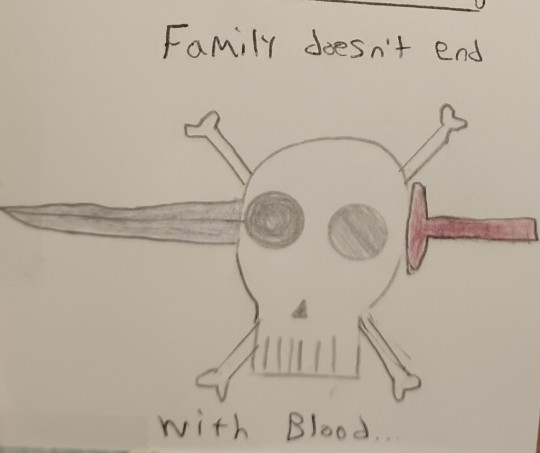
(Crew Tryouts Poster):

#disney#melissa de la cruz#disney descendants#descendants#wicked world#descendants au#disney descendants au#disney descendants alternate universe#disney descendants ocs#pirates#original pirate ships#my art#my sketches#etc
14 notes
·
View notes
Text
About doppelgangers of different genders - isn’t Randolf Morgan male doppelganger of Tess Morgan? They both Wells’ partners in founding STARLabs... Just saying...
13 notes
·
View notes
Note
Speaking of Nash having it rough and the gifset you posted, did you notice how Nash said "I do," when Barry was asking about how he can't understand why he'd want to rescue Iris? Did he have a Tess of his own??
Hey anon, great question!
To start, every Harrison Wells, aside from Sherloque and anyone a part of the Council, that we've seen has had a Morgan counterpart.
E-1 Harrison "Cupcake" had his wife, Tess.
E-2 Harrison "Harry" also had his wife, Tess.
E-19 Harrison "H.R." had his partner, Randolf Morgan. It's not clear, for me at least, if H.R. is bisexual or simply experimental because we've only seem him protrayed as a ladies man, and he was in a romantic relationship with Tracey, however, it's hard for me to believe that he didn't have some sort of intimate relationship with his Morgan counterpart.
E-22 Harrison "Wells 2.0", we don't know much about his romantic life, BUT we do know that he has a daughter, so I don't doubt that he too had his very own Tess.
Sorry, I don't mean to drone on with a list of all the Wells I can think of, so finally the possible answer to your question:
For E-719 (at least I believe he's from E-719) Harrison "Nash", again, we don't know much about his romantic background, but I can't help but think that Nash also had his own Morgan counterpart. Male or female, the loss of a loved one, figurative or literally, isn't something new to Nash.
We know that when he met Maya, that he was single, or at least not married.
I can imagine their situation being that Nash would go away months at a time on his adventures, while his loved one was back home. Then, it became a cycle: Nash would leave to solve a mystery, come back home, then leave again once the next mystery came up. Eventually, this could have taken a toll on his Morgan counterpart, and Morgan probably decided it was best to end the relationship.
10 notes
·
View notes
Text
H.R.446 To extend the deadline for commencement of construction of a hydroelectric project.
H.R.446, sponsored by Rep. Morgan Griffith, became law on July 23rd, 2018. https://ift.tt/2teiEr7
0 notes
Photo


House Committee on Un-American Activities (p 1,3), 1/17/1962
The Committee approved the introduction of legislation to “correct the situation” of passports being issued to members of the Communist Party, and approved the investigation of several groups.
File Unit: Minutes of Full Committee and Subcommittee Meetings of the Internal Security Committee During the 80th through 93rd Congresses, 1945 - 1976
Series: Committee Papers, 1945 - 1975
Record Group 233: Records of the U.S. House of Representatives, 1789 - 2015
Transcription:
COMMITTEE ON UN-AMERICAN ACTIVITIES
January 17, 1962
The Committee on Un-American Activities met in executive session on Wednesday, January 17, 1962, in Room 225 at 10:00 o'clock a.m. The following members were present:
Francis E. Walter, Chairman
Morgan M. Moulder
Clyde Doyle
Edwin E. Willis (10:15 a.m.)
William M. Tuck
Gordon H. Scherer
August E. Johansen
Donald C. Bruce
Henry C. Schadeberg
Also present were the following members of the Committee staff: Frank S. Tavenner, Jr., Director; Alfred M. Nittle and John C. Walsh, Counsel; Gwenn Lewis, Administrative Assistant; and Juliette P. Joray, Recording Clerk.
The Chairman called the meeting to order at 10:05 a.m.
The Chairman expressed his concern over the regulations recently issued by the Department of State concerning the issuance of passports to members of Communist organizations. He stated that in his opinion an amendment should be added to the Internal Security Act of 1950 to correct this situation. The Committee agreed and the Chairman instructed the staff to prepare the necessary legislation for introduction at the earliest opportunity.
The Director called the attention of the Committee members to a Committee print entitled "The New Role of National Legislative Bodies in the Communist Conspiracy" a reprint of "How Parliament Can Play a Revolutionary Part in the Transition to Socialism, and "The Role of the Popular Masses" by Jan Kozak, historian of the Communist Party of Czechoslovakia. Early consideration was suggested and on a motion by Mr. Scherer, seconded by Mr. Doyle and unanimously adopted, it was agreed to authorize the printing of this document.
The resolution for funds providing for $331,000.00 for the operation of the Committee during the calendar year of 1962 was submitted to the members for their consideration. Mr. Scherer offered an amendment increasing the amount to $350,000.00. The resolution as amended was agreed to and reads as follows:
RESOLVED, That effective January 4, 1962, expenses of conducting the investigations authorized by Section 18 of Rule XI of the Rules of the House of Representatives, incurred by the Committee on Un-American Activities, acting as a whole or by subcommittee, not to exceed $350,000.00, including expenditures for employment of such experts, special counsel, investigators, and such clerical, stenographic, and other assistants, and which shall also be available for expenses
[page 2]
January 17, 1962
Page 3
The Director reminded the Committee that H.R. 4469 and H.R. 5751, bills emanating from this Committee, had passed the House during the first session and were awaiting action in the Senate.
The Committee considered and approved preliminary investigations now being conducted by the staff which may result in future hearings. Among these are developments in Communist efforts to evade the effects of the Internal Security Act of 1950, more specifically, the expulsion from the Buffalo Communist Party of six members who advocated the dissolution of the Communist Party because of the registration required by the Act. It is believed that some of these persons might be developed into friendly witnesses if contacted.
Also included is an investigation of three people in Buffalo who used the 5th Amendment before the Committee and whose names appear in the indictment prepared against this Committee by the American Civil Liberties Union. It is understood that a witness can be found who can identify these three persons as having continued their membership in the Communist Party after having been reinstated in their jobs by a Court decision.
And investigation of the American Negro Labor Vanguard was also approved by the Committee, This is a new organization of Communist members which appears to have the cooperation of the Socialist Workers Party, the Workers World Party and a number of Negro nationalist groups.
Other preliminary investigations considered and approved by the Committee include the Women's Peace Groups; youth groups, including the publication "New Horizons for Youth," Communist organ for youth groups; propaganda activities conducted through the Russian and Greek Orthodox Churches; and legislation involving tax exemptions of Communist organizations, the Chicago Committee to Defend the Bill of Rights and the Emergency Civil Liberties Union.
The following action was taken by the Committee relative to the proposed hearings in Los Angeles, California, later this year:
BE IT RESOLVED, that a hearing by the Committee on Un-American Activities or a subcommittee thereof be held in Los Angeles, California, at such time as the Chairman may designate relating to the structure, objectives and activities of the Communist Party in Southern California for the legislative purpose of receiving information designed to aid the Committee and Congress in determining whether the Internal Security Act of 1950 should be amended in a manner to make unlawful membership in the Communist Party of the United States, and that the staff of the Committee be authorized to conduct investigations deemed reasonably necessary in a preparation for said hearings.
#archivesgov#January 17#1962#1960s#House of Representatives#Un-American Activities Committee#communism#Red Scare#Congress
32 notes
·
View notes
Text
Stormbringer Crew Species;
Aaron Bog (The Treasuer)= Demon-Human Hybrid.
Abi Hun (Crewmate)(Former)= Human.
Alex Aoratos-Sinclair (Helmsman)= Demigod.
Amira Bint Aladdin Bin Cassim Al Hamed of Agrabah (Translator)(Future)= Human.
Anna Bog (The Lawyer)= Demon-Human Hybrid.
Artemis Foundling (Junior)= (Thought To Be) Human With Severe Jaundice.
Athena Queen (The New Powder Monkey and Rigger)= Witch.
Atlas Foundling (Junior)(Future)= (Thought To Be) Changeling-Shapeshifter Hybrid.
Atticus Hook (Babysitter Crewmate)(Former)= Human.
Beau Foundling (Junior)= Human-Goblin-Troll Hybrid.
Clarisse Foundling (Junior)(Future)= Orge-Human Hybrid.
Craven Bog (Junior)(Future)= Demon-Human Hybrid.
Credence Foundling (Junior)= Centaurcorn.
D.E Anonymous (Anonymous Helper)= Unknown. Thought to be a ghost.
Darcy Aoratos (The Medic)= Witch Demigod.
Darius Foundling (Junior)= Mummy-Human Hybrid.
Darren Foundling (Junior)(Future)= Disabled Human.
Derrick Red (Crewmate )(Former)= Human.
Eduardo Frollo (The Cooper)= Human.
Elara Foundling (Junior)= (Thought To Be) Elf-Human Hybrid.
Evelyn de la Cruz (The Prison Guard)= Witch.
Fiona Foundling (The Look Out)= Fairy.
Francesca Delgado (The Boatswain )(Former)= Witch.
Genesis Flores (The Navigator )(Former)= Witch.
Greyson Hook (Crewmate )(Former)= Human.
Gunner Harp (Back up Medic)= Demigod-Harp Angel Humanoid Hybrid.
Hannah Hook (Captain)= MagicBorn Witch.
Harley Foundling (Junior)= Green Humanoid Thought To Be From An Alternate Realm.
Haul Bjorgman (The Deckhand and Translator )(Future)= Human (But Could Be Considered A Reverse Changeling Via His Father).
Herlando Dancer (Back up Medic)= Vampire-Human Hybrid.
Hope Sid (The Entertainment and H.R. Representative)= Banshee-Wizard Hybrid.
Howiee Wolf (Guard)= Werewolf-Wolf Humanoid Hybrid.
Ian Hook (Crewmate )(Former)= Human.
Ike Bog (Junior )(Future)= Demon-Human Hybrid.
Issac Cipher (Front Desk Attendant)= Extradimensional Dream Demon (Possibly A Hybrid).
Isaac Olympian (Crewmate )(Former)= Godling.
Isaac of Maldonia (Crewmate )(Former)= Human.
James Rourke (The Rigger)(Former)= Human.
Joey Skylights (Crewmate )(Former)= Human.
John Facilier (The Gunner)= Evil Bokor-Demigod Hybrid. Jolene Bog (Junior )(Future)= Demon-Human Hybrid.
Josh de la Cruz (The Sailmaker)= Witch.
Joy Foxworth (The Back Up Back up Kid Wrangler )(Future)= Human.
Kailani ‘Clever’ Olympian (Storm Manager)= Evil Bokor-Demigod Hybrid.
Lance Foundling (Junior )(Future)= Black Eyed, Forked Tongued, Albino Human That Was Saved From Becoming An Imbunche (By Hannah).
Levi Giant (Junior)= Human-Giant Hybrid.
Liberty Titan (The Backup Carpenter)= Titan-Cyclops Hybrid.
Luke Tremaine-Westergaard (1st Mate)= Human.
Luís Barbosa (The Carpenter)= Human.
Lysander Foundling (Junior)= Satyr (But Suspected Hybrid).
Marcys Foundling (Junior)= Centaur (But Suspected Hybrid).
Marinette Foundling (Junior)= Bluish-Grey Humanoid.
Misty Del Rey-Silver (The Diver)= Human-Merperson Hybrid.
Morgan Hook (Crewmate )(Former)= Human.
Moxie Frankenstein-Van Helsing (Guard)= Born Human, Resurrected Into Something Akin To A Wendigo But Not Exactly.
Nadia Foundling (Junior)= Genie-Human Hybrid.
Nevin Hook (Crewmate )(Former)= Human.
Noah Aoratos (The Cabin Boy)= Godling.
Noor Foundling (Junior)= Genie-Human Hybrid.
Parker McLeach (The Powder Monkey)(Former)= Human.
Peachy Gothel (3rd Mate)= Witch/Magical Person.
Prometheus Foundling (Junior)(Future)= Disabled Human.
Remi de Vil (4th Mate)= Human Of Godly Decent.
Rian Frankenstein-Van Helsing (The Trainer)= Born Human, Resurrected Into Something Zombie-Like.
River Le Beak (Crewmate)= Human-Merperson Hybrid.
Shan Bri (The Back up Kid Wrangler)= Human (With A Magical Parent).
Shania Silver (The Kid Wrangler )(Former)= Human-Merperson Hybrid.
Shaun Fagin (Crewmate )(Former)= Human.
Skelebar Foundling (Junior )(Future)= Humanoid Creature.
Skia Aoratos (2nd Mate)= Godling.
T.K Sykes (Crewmate )(Former)= Human.
Terrance Foundling (Junior)= Werewolf-Vampire Hybrid.
Tiger Khan (Translator)= Human Raised By A Tiger.
Tim Foundling (Junior )(Future)= Human Child Who Ages Backwards (Physically).
Toby Foundling (Junior )(Future)= Merperson.
Tommy Wonderful (Junior)= Witch/Magical Person.
Treycor Fae-Aoratos (The Quartermaster)= Fairy-Demigod Hybrid.
Tyson Foundling (Junior)= Werecat.
Willow Hawthorne (Junior)= Human-Tree Nymph Hybrid.
I just realized that Hannah Hook's crew are mostly none-humans. Which means that some things they all do would defo come off as off putting to those in Auradon lol.
#descendants#disney descendants#melissa de la cruz#disney#descendants au#wicked world#disney descendants au#the marvelous misadventures of hannah hook#the stormbringer#etc
6 notes
·
View notes
Link
House panel advances bill to study reparations for descendants of enslaved Americans The House Judiciary Committee late Wednesday night approved H.R. 40 by a vote of 25-17. The measure proposes the creation of a federal commission to study reparations and recommend remedies for the harm caused by slavery and the discriminatory policies that followed abolition. The commission would also consider how the US would formally apologize for “perpetration of gross human rights violations and crimes against humanity on African slaves and their descendants.” This legislation, however, has a very little chance of becoming law. Even if the bill is scheduled for a floor vote, it faces opposition from some Democrats and most Republicans and it’s unlikely it will receive the 60 votes needed to break a filibuster in the Senate. A Democratic aide told CNN that while this is the last step before a bill goes to the floor for a vote, there are a lot of reasons why this legislation may never have a full House vote. There are a number of steps in that process — and time constraints, vote considerations, as well as the news of the day can all be factors in why a bill doesn’t get to the floor for a vote. But many are still pushing for this legislation to pass, including House Judiciary Committee chairman Jerry Nadler, a Democrat from New York. “This moment of national reckoning comes at a time when our nation must find constructive ways to confront a rising tide of racial and ethnic division,” he said in his opening remarks of the committee hearing. “White nationalism and police-community conflict are just part of the long legacy of anti-Black racism that has shaped our nation’s laws, institutions, and societal attitudes.” And Democratic Rep. Sheila Jackson Lee from Texas, who sponsored the bill, said in a statement before the vote in the Judiciary committee that the legislation was “long overdue.” “We’re asking for people to understand the pain, the violence, the brutality, the chattel-ness of what we went through,” she said during the committee hearing Wednesday. The deaths of Black Americans at the hands of police, including George Floyd, Breonna Taylor and most recently Daunte Wright, have drawn increased attention for Congress to do something about racial injustice and how they can address America’s longtime racism of African-Americans in the country. Republican Rep. Burgess Owens, who is the descendent of slaves, said during the committee markup that “slavery was and is still evil” but that “reparation is divisive” and demeaning to Black Americans. “It speaks to the fact that we are a hapless, hopeless race that never did anything but wait for White people to show up and help us,” the Utah Republican argued. “And it’s a falsehood. It’s demeaning to my parents’ generation.” Ahead of the committee vote Wednesday, House Majority Leader Steny Hoyer, who sets the floor schedule, did not say when the bill would receive a full House floor vote. “We’ll see what the committee does and at that point in time, I’ll start to think about, what, what we’ll do” Hoyer said. Hoyer said he hopes that President Joe Biden will establish a presidential commission to study reparations. “I am also hopeful, that the President, who has mentioned this as an issue he cares a great deal about, I would hope that the President himself would move ahead with the convening of a commission, Presidential Commission, that would look at this issue, and come up with suggestions as to what actions are appropriate.” H.R. 40, which was first introduced in Congress in 1989 by Michigan Democrat John Conyers, is named for Gen. William Sherman’s Field Order No. 15 — a promise of 40 acres and a mule to former slaves at the end of the Civil War. Jackson Lee said Tuesday that the Congressional Black Caucus discussed reparations with Biden during their meeting that day, and that Biden is “committed to the concept” of reparations. This story has been updated with additional developments Thursday. CNN’s Morgan Rimmer, Manu Raju, Jason Hoffman and Annie Grayer contributed to this report. Source link Orbem News #advances #Americans #Bill #descendants #enslaved #House #HousepaneladvancesbilltostudyreparationsfordescendantsofenslavedAmericans-CNNPolitics #Panel #Politics #Reparations #Study
0 notes
Text
House panel advances bill to study reparations for descendants of enslaved Americans
New Post has been published on https://appradab.com/house-panel-advances-bill-to-study-reparations-for-descendants-of-enslaved-americans/
House panel advances bill to study reparations for descendants of enslaved Americans
The House Judiciary Committee late Wednesday night approved H.R. 40 by a vote of 25-17.
The measure proposes the creation of a federal commission to study reparations and recommend remedies for the harm caused by slavery and the discriminatory policies that followed abolition. The commission would also consider how the US would formally apologize for “perpetration of gross human rights violations and crimes against humanity on African slaves and their descendants.”
This legislation, however, has a very little chance of becoming law. Even if the bill is scheduled for a floor vote, it faces opposition from some Democrats and most Republicans and it’s unlikely it will receive the 60 votes needed to break a filibuster in the Senate.
A Democratic aide told Appradab that while this is the last step before a bill goes to the floor for a vote, there are a lot of reasons why this legislation may never have a full House vote. There are a number of steps in that process — and time constraints, vote considerations, as well as the news of the day can all be factors in why a bill doesn’t get to the floor for a vote.
But many are still pushing for this legislation to pass, including House Judiciary Committee chairman Jerry Nadler, a Democrat from New York.
“This moment of national reckoning comes at a time when our nation must find constructive ways to confront a rising tide of racial and ethnic division,” he said in his opening remarks of the committee hearing. “White nationalism and police-community conflict are just part of the long legacy of anti-Black racism that has shaped our nation’s laws, institutions, and societal attitudes.”
And Democratic Rep. Sheila Jackson Lee from Texas, who sponsored the bill, said in a statement before the vote in the Judiciary committee that the legislation was “long overdue.”
“We’re asking for people to understand the pain, the violence, the brutality, the chattel-ness of what we went through,” she said during the committee hearing Wednesday.
The deaths of Black Americans at the hands of police, including George Floyd, Breonna Taylor and most recently Daunte Wright, have drawn increased attention for Congress to do something about racial injustice and how they can address America’s longtime racism of African-Americans in the country.
Republican Rep. Burgess Owens, who is the descendent of slaves, said during the committee markup that “slavery was and is still evil” but that “reparation is divisive” and demeaning to Black Americans.
“It speaks to the fact that we are a hapless, hopeless race that never did anything but wait for White people to show up and help us,” the Utah Republican argued. “And it’s a falsehood. It’s demeaning to my parents’ generation.”
Ahead of the committee vote Wednesday, House Majority Leader Steny Hoyer, who sets the floor schedule, did not say when the bill would receive a full House floor vote.
“We’ll see what the committee does and at that point in time, I’ll start to think about, what, what we’ll do” Hoyer said.
Hoyer said he hopes that President Joe Biden will establish a presidential commission to study reparations.
“I am also hopeful, that the President, who has mentioned this as an issue he cares a great deal about, I would hope that the President himself would move ahead with the convening of a commission, Presidential Commission, that would look at this issue, and come up with suggestions as to what actions are appropriate.”
H.R. 40, which was first introduced in Congress in 1989 by Michigan Democrat John Conyers, is named for Gen. William Sherman’s Field Order No. 15 — a promise of 40 acres and a mule to former slaves at the end of the Civil War.
Jackson Lee said Tuesday that the Congressional Black Caucus discussed reparations with Biden during their meeting that day, and that Biden is “committed to the concept” of reparations.
This story has been updated with additional developments Thursday.
Appradab’s Morgan Rimmer, Manu Raju, Jason Hoffman and Annie Grayer contributed to this report.
0 notes
Text
H.R.447 To extend the deadline for commencement of construction of a hydroelectric project.
H.R.447, sponsored by Rep. Morgan Griffith, became law on July 23rd, 2018. https://ift.tt/2rjXNpz
0 notes
Link

Last week, Oregon Representative Kurt Schrader (D) and Virginia Representative Morgan Griffith (R) introduced The Hemp and Hemp-Derived CBD Consumer Protection and Market Stabilization Act of 2020 (“H.R. 8179”). If enacted in its current form, H.R. 8179 would legalize the manufacture, sale and marketing of hemp, hemp-derived cannabidiol and other hemp extracts (collectively referred to […]
0 notes
Photo

New Post has been published on https://supremekalm.com/a-bipartisan-bill-would-regulate-hemp-cbd-as-a-dietarysupplement/
A Bipartisan Bill Would Regulate Hemp CBD as a Dietary Supplement
Last week, Oregon Representative Kurt Schrader (D) and Virginia Representative Morgan Griffith (R) introduced The Hemp and Hemp-Derived CBD Consumer Protection and Market Stabilization Act of 2020 (“H.R. 8179”). If enacted in its current form, H.R. 8179 would legalize the manufacture, sale and marketing of hemp, hemp-derived cannabidiol and other hemp extracts (collectively referred to as “Hemp Products”) as dietary supplements under the Federal Food, Drug and Cosmetic Act (“FDCA”).
This means that these products would be exempt from the FDCA’s “Drug Exclusion Rule,” which, as we previously discussed, currently prevents the sale and marketing of any substance that has been approved or investigated by the FDA as a new drug as a conventional food or dietary supplement – In July 2018, the FDA approved CBD as a drug ingredient in Epidiolex.
To be compliant with the FDCA, these Hemp Products would need to meet the existing regulatory framework imposed on dietary supplements. This comprehensive regulatory framework mandates, in part, that these products be safe as well as properly labeled and marketed.
Because Hemp Products were not sold and marketed in the U.S. as dietary supplements or conventional foods before October 15, 1994, they would be deemed “new dietary ingredients” or “NDIs”.
Pursuant to Section 413 of the FDCA, if a dietary supplement contains an NDI, its manufacturer and distributor must ensure that the NDI is adequately substantiated as being safe and must notify the FDA about that ingredient prior to marketing.
To meet this standard, manufacturers and distributor of Hemp Products would have to provide the FDA with information that is the basis on which they have concluded that their Hemp Products are reasonably expected to be safe under the conditions recommended or suggested in the labeling.
If the manufacturers or distributors were to receive a no-objection letter from the FDA, or no response at all, they could lawfully market their Hemp Products after the 75-day notification period is over, assuming there is in fact a history of use or other evidence of safety establishing that the Hemp Products, when used under the conditions recommended or suggested in the labeling, are reasonably expected to be safe.
When it comes to labeling requirements, manufacturers and distributors of Hemp Products would need to ensure their product packaging contains specific labeling elements, such as an identity statement and a nutrition facts panel and contain no medical claims about the therapeutic values of their products. Inclusion of medical claims would suggest that the Hemp Products’ intended use is that of a drug, and thus, would violate the FDCA and warrant FDA and Federal Trade Commission (“FTC”) enforcement actions.
In sum, the enactment of H.R. 8179 would help alleviate regulatory uncertainties surrounding the legality of Hemp Products, which have hindered market opportunities for hemp farmers and businesses. In addition, the passage of this bipartisan bill would help raise the quality and safety of Hemp Products, and thus, protect consumers.
If, like a consensus of hemp stakeholders, you support H.R. 8129, you should contact your representatives and urge them to co-sponsor this bill. For automatically generated messages, visit the U.S. Hemp Rountable’s online Action Center.
The post A Bipartisan Bill Would Regulate Hemp CBD as a Dietary Supplement appeared first on Harris Bricken.
0 notes
Text
rosesdieinaweek
“And you don’t choose your family. Even though technically my dads did. A few times.” A laugh accompanied her words, “You know that you probably could. There are so many people who care about this place and it running well, myself included, that it could survive for a couple of weeks if you took some time off. Even go somewhere else here if you want to stay in the country.” She loved this job, loved this company so much that Morgan knew it would take a lot if she ever decided to leave. For now she was content to just do her job the best that she could and write in her own free time. Though right now she wasn’t under any impressions that it was good enough for anyone to read. Another laugh at his words, “Ha, vertically challenged is already on there. Most people just think that means short.”
A small smile on her face as she nodded, “I can do that.” She was used to being a buffer if she had to with other heads of departments (well aware that finance did not like her at all) and would always remember their reactions to Simon having an assistant that wouldn’t let them walk all over her. Changing quickly she began to move around his day, absorbed in what she was doing until it was time to start finding a temp. Keeping her face blank was almost impossible but she managed it, even if she was clenching the chair as one of them just flirted with her boss. Telling herself it was because that was unprofessional. “Okay well I can see you clashing with number one after an hour. Number two seems like she could work but just a slight adjustment. Number three– well I don’t think she was too interested in the job if you want me to be frank.” Taking a drink of the coffee in front of her as soon as she was finished.

"Absolutely." He nodded mentioned the first candidate, then just hummed at the second one and when it came to the master one, Simon shook his head and laughed. "I should have gone to H.R." He joked. "Ban her from any other posible position." It wasn't a bad boost when a woman flirted with him, she was beautiful enough that he would have gone gone with her had that met somewhere else but he knew fully well knew not to shit where you eat. Not so much his ex fiancé as Helen kept thinking he'd cheat on her with Morgan; he wasn't blind and could appreciate his assistant's beauty yet never once he made an innuendo towards her. He was professionally. "Alright then. Guess it'll be number two. I trust you'll get in her in the right track until you leave?" When he finally stepped as boss, his father secretary was still working, a woman nearing her fifties who didn't like Simon and made the agenda to his father's pace; it had been a hard call but in the end he fired her and so three assistants passed through the office before Morgan's arrival and she was what he needed. Disposing of her even if it was temporal felt like going backwards and do everything himself instead of deal with an assistant who got in the way instead of clearing it. "When are you leaving again?" Simon was sure she told him but he couldn't remember an approximate date even. "Oh, when's that fundraising for the library by the way? I need to get a suit."

86 notes
·
View notes